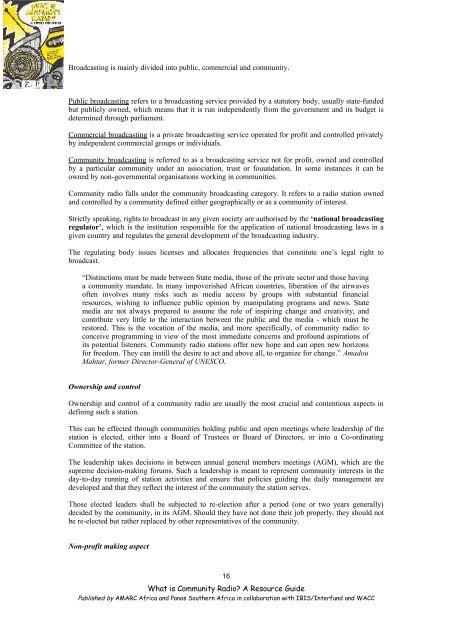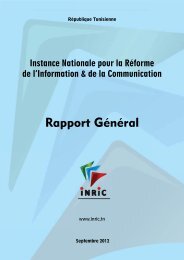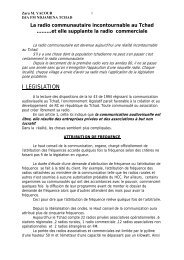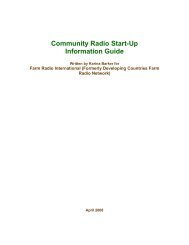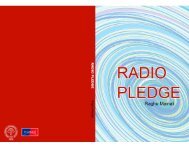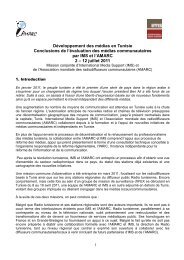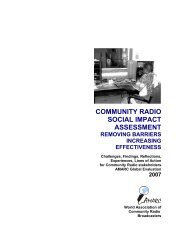WHAT IS COMMUNITY RADIO - amarc
WHAT IS COMMUNITY RADIO - amarc
WHAT IS COMMUNITY RADIO - amarc
Create successful ePaper yourself
Turn your PDF publications into a flip-book with our unique Google optimized e-Paper software.
Broadcasting is mainly divided into public, commercial and community.<br />
Public broadcasting refers to a broadcasting service provided by a statutory body, usually state-funded<br />
but publicly owned, which means that it is run independently from the government and its budget is<br />
determined through parliament.<br />
Commercial broadcasting is a private broadcasting service operated for profit and controlled privately<br />
by independent commercial groups or individuals.<br />
Community broadcasting is referred to as a broadcasting service not for profit, owned and controlled<br />
by a particular community under an association, trust or fouundation. In some instances it can be<br />
owned by non-governmental organisations working in communities.<br />
Community radio falls under the community broadcasting category. It refers to a radio station owned<br />
and controlled by a community defined either geographically or as a community of interest.<br />
Strictly speaking, rights to broadcast in any given society are authorised by the ‘national broadcasting<br />
regulator’, which is the institution responsible for the application of national broadcasting laws in a<br />
given country and regulates the general development of the broadcasting industry.<br />
The regulating body issues licenses and allocates frequencies that constitute one’s legal right to<br />
broadcast.<br />
“Distinctions must be made between State media, those of the private sector and those having<br />
a community mandate. In many impoverished African countries, liberation of the airwaves<br />
often involves many risks such as media access by groups with substantial financial<br />
resources, wishing to influence public opinion by manipulating programs and news. State<br />
media are not always prepared to assume the role of inspiring change and creativity, and<br />
contribute very little to the interaction between the public and the media - which must be<br />
restored. This is the vocation of the media, and more specifically, of community radio: to<br />
conceive programming in view of the most immediate concerns and profound aspirations of<br />
its potential listeners. Community radio stations offer new hope and can open new horizons<br />
for freedom. They can instill the desire to act and above all, to organize for change.” Amadou<br />
Mahtar, former Director-General of UNESCO.<br />
Ownership and control<br />
Ownership and control of a community radio are usually the most crucial and contentious aspects in<br />
defining such a station.<br />
This can be effected through communities holding public and open meetings where leadership of the<br />
station is elected, either into a Board of Trustees or Board of Directors, or into a Co-ordinating<br />
Committee of the station.<br />
The leadership takes decisions in between annual general members meetings (AGM), which are the<br />
supreme decision-making forums. Such a leadership is meant to represent community interests in the<br />
day-to-day running of station activities and ensure that policies guiding the daily management are<br />
developed and that they reflect the interest of the community the station serves.<br />
Those elected leaders shall be subjected to re-election after a period (one or two years generally)<br />
decided by the community, in its AGM. Should they have not done their job properly, they should not<br />
be re-elected but rather replaced by other representatives of the community.<br />
Non-profit making aspect<br />
16<br />
What is Community Radio? A Resource Guide<br />
Published by AMARC Africa and Panos Southern Africa in collaboration with IB<strong>IS</strong>/Interfund and WACC


